Iran Threatens Saudis Over Media Coverage of Anti-Regime Protests
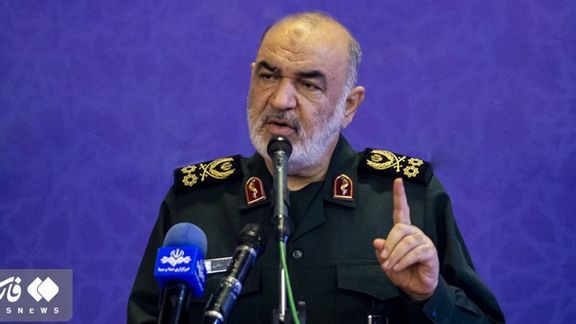
Commander of Iran’s Revolutionary Guard Hossein Salami has threatened Riyadh over the coverage of nationwide protests in Iran by the media it allegedly controls.

Commander of Iran’s Revolutionary Guard Hossein Salami has threatened Riyadh over the coverage of nationwide protests in Iran by the media it allegedly controls.
Salami claimed that Saudis are trying to provoke the Iranian youth, threatening that if they do not control their media the consequences will be unavoidable.
Speaking at a wargame staged by the IRGC ground forces near Aras region in the northwest of Iran, he said Saudis are seeking to “deceive Iranian youths by some media.”
“This is our last warning, because you are interfering in our internal affairs through these media, we told you, be careful,” added Salami.
He further said that Iran’s policy with neighbors is based on “friendship and good neighborliness” as well as “correct political interaction,” but if the neighbors endanger the security of the Iranian nation and country, Tehran’s policy will change too.
Salami’s statements are the last among several threats by the Iranian regime officials against the Persian-speaking media based outside the country like the BBC Persian, Manoto TV, Iran International and the VOA.
This comes as the clerical regime is constantly threatening families and relatives of the correspondents of these networks who reside in Iran and jams satellite television signals to limit access to their programs.
Many journalists and media activists have also been arrested in Iran after the new wave of anti-regime protests in a move to suppress the circulation of information.
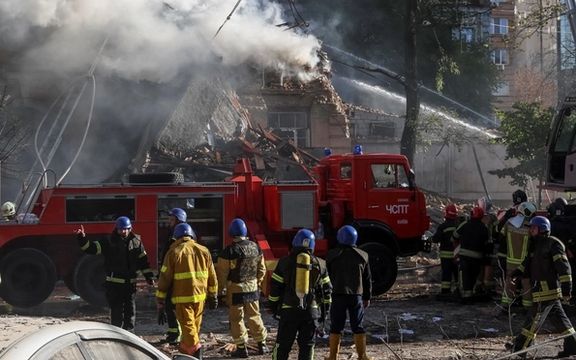
Iran-European Union relations have soured with claims Tehran has supplied Russia with armed drones used in Ukraine, although the EU is not yet expected to agree new sanctions.
Arriving in Luxemburg Monday for a meeting of EU foreign ministers, Josep Borrell, the EU foreign policy chief, said Europe would look for “concrete evidence” over reports that Russia had used Shahed-136 drones in recent weeks. The Washington Post backed up Ukrainian claims Sunday citing US and “allied” officials speaking anonymously.
The Washington Post cited “an intelligence assessment shared in recent days with Ukrainian and US officials [that] contends Iran’s armaments industry is preparing a first shipment of [surface-to-surface] Fateh-110 and Zolfagher missiles…” Reuters reported Monday its reporter had seen pieces of a drone bearing the words ‘For Belgorod,’ presumably referring to Saturday’s gunning down of 11 Russian trainee soldiers 40km north of the Ukraine border.
There have been differences within the 27-member EU over the Russia-Ukraine conflict over the extent of sanctions against Moscow, which continues to supply gas and oil to many European states. Denmark’s Foreign Minister, the Social Democrat Jeppe Kofod, called Monday for the EU to take “concrete steps” in response to Russian attacks on Kyiv Monday morning, with Reuters reporting at least three deaths. “Iranian drones are used apparently to attack in the middle of Kyiv, this is an atrocity,” Kofod said.
France has argued that Iran supplying drones to Russia would violate United Nations Security Council Resolution 2231, which endorsed the 2015 Iran nuclear agreement. Paris bases its case on the non-binding, informal Missile Technology Control Regime (MTCR) agreed by 35 states including Russia.
As signatories to the JCPOA, both France and Germany have been involved in the talks aimed at reviving the agreement, which the US left in 2018 prompting Iran to expand its nuclear program beyond JCPOA limits. The leeway for new European sanctions has been reduced by decline of Europe-Iran trade given European companies’ fear of US action against them under the ‘maximum pressure’ sanctions Washington introduced on leaving the JCPOA. Nonetheless, Luxembourg’s Foreign Minister Jean Asselborn Monday it was “no longer” enough just to extended the existing list of sanctioned Iranian individuals.
Iran denies supplying weapons to Russia. Foreign Minister Hossein Amir-Abdollahian said Saturday – in comments made by telephone to Portuguese foreign minister Joao Gomes Cravinho – that Tehran believed “the arming of each side of the crisis will prolong the war.” The US has sent Ukraine $16.8 billion in aid, mainly in weapons, and the EU $2.5 billion, although Washington is denying Ukraine more advanced weapons so as to avoid escalation. Washington has said it wants to degrade Russian capacity as its stocks of Cruise and other missiles diminish.
‘Inconsistent behavior’
Comments made Monday by Iran’s Foreign Ministry spokesman Nasser Kanaani reflected a deteriorating tone in EU-Iran relations. Kanaani highlighted what he said was “inconsistent behavior” by the French in suggesting there was “good and bad terrorism” and in condemning “disturbances” and “labor strikes” in France but welcoming them in Iran.
Kanaani portrayed Iran as an “anchor of stability” in a region where many countries – he cited Afghanistan, Iraq and Syria – “fell into chaos and were exposed to terrorism and foreign attacks.” The spokesman said that an arson attack on an Iranian school in Hamburg Thursday showed a failure to provide security for “Iranian diplomatic places.” He said there was a “bitter irony that the countries that export millions of dollars of arms to one side of the war [had] started a propaganda war against Iran.”
Kanaani stressed that while new EU sanctions would lead to “reciprocal reactions” from Iran, “the path of negotiations” was separate. The EU has coordinated efforts to revive the 2015 agreement, both in meetings April 2021-March 2022 in Vienna of all JCPAO signatories (China, France, Germany, Iran, Russia, the United Kingdom, with the United States taking part indirectly) and in subsequent bilateral contacts between Iran and the US. Kanaani also said Monday a prisoner exchange with the US was being held up by Washington’s insistence that the 2015 agreement be revived first.
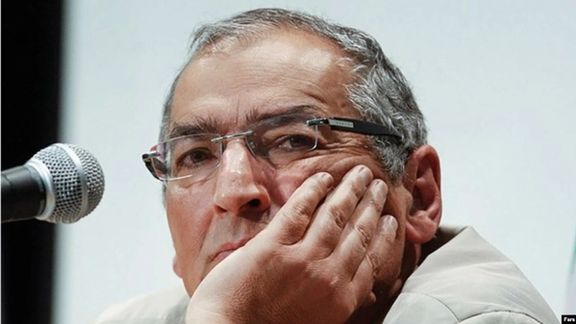
Sadegh Zibakalam, a former revolutionary who has become an outspoken citric of hardliners in Iran, has said the ongoing protests have startled the Islamic Republic's authorities.
Zibakalam, who has been recently banned from teaching at University of Tehran for his frequent berating remarks against the government, said in an interview on Sunday that the sheer volume of the protests has surprised everyone, including the statesmen and those who are serving in the government, parliament and the judiciary.
The ‘reformist’ analyst said that the officials are not sure how to react to such a huge uprising and are confused due to a lack of appropriate responses.
The political science university professor added that he himself is surprised by the big role of universities in the protests, noting that even students andprofessors ofnumerous branches of Azad University – who usually do not participate in antigovernment rallies – have beentaking part in the nationwide demonstrations.
Stressing that he does not want to "ignore the economic problems," he said the main cause of the current wave of protests is the hatred against the so-called ‘morality’ police or hijab enforcement patrols. "The fuel and ammunition of these protests is social discontent," he added, noting that women and Generation Z are the two main groups of protesters.
The uprising was ignited over the death in custody of 22-year-old Mahsa Amini and protest rallies first erupted in her hometown Saqqez and capital Tehran and soon spread to all over the country, garnering support from Iranian expatriate communities around the world as well as foreign governments and officials.
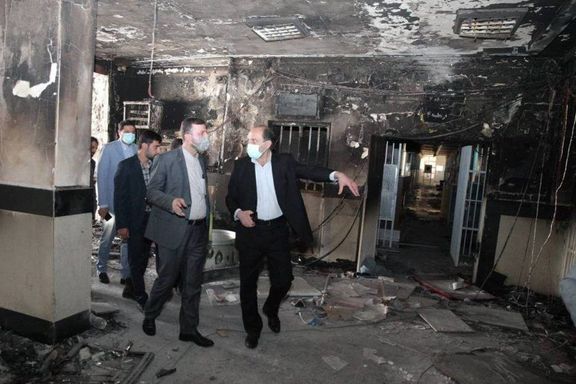
The Iranian Judiciary's news agency says the number of deaths from the fire which broke out at Tehran’s Evin prison on Saturday evening has now risen to eight.
According to the Judiciary, four more prisoners, who were in critical condition in hospital, succumbed to their injuries to bring the death toll to eight.
The Monday report has not mentioned the cause of the new deaths while on Sunday it said the first four lost their lives due to inhaling smoke.
The identities of the deceased have not been revealed yet, but the hard-liner Judiciary says they were theft-related convicts.
There is no chance in Iran for any independent investigation as to how the blaze started and exactly how many prisoners were killed. The Judiciary is a political institution fully at the service of the ruling elite, directly under Supreme Leader Ali Khamenei's control.
The large fire at the notorious prison began on Saturday evening, leaving tens of prisoners wounded while gunshots and blasts were also reported.
The prison fire infuriated the anti-government protesters once more with university students chanting slogans saying Evin had turned into a slaughterhouse.
The Evin fire caused global reactions soon after. EU foreign policy chief Josep Borrell said on Sunday that Iranian authorities are responsible for lives of all detainees, including human rights defenders and EU nationals.
German Foreign Minister Annalena Baerbock also said, “The government of Iran bears responsibility for all those imprisoned in Tehran's Evin Prison, including many political prisoners and demonstrators.”
Meanwhile, the number of signatures in an online campaign aimed at the leaders of the seven industrialized countries of the world, G7, has reached the 200 thousand mark. The petition calls on these countries to recall their ambassadors from Iran and expel diplomats and officials of the Islamic Republic.
Initiated by Kaveh Shahrouz, a lawyer and human rights activist living in Canada, on October 13, the campaign also demands the release of inmates from Iranian prisons.
However, reports from Iran show that the regime is still getting prepared to crack down on the protests and strikes. Following a strike and call for protests by the workers of Haft-Tappeh sugar factory in the southern oil-rich Khuzestan province, it was reported that the employer's agents are attempting to create division among the workers to prevent any gatherings.
However, the workers’ unofficial union social media channel has called on members to be alert and participate in a protest on Tuesday morning.
Iran’s oil workers last week joined the anti-regime protests. Workers of refineriesin southern oil-rich provinces of Bushehr, Khuzestan and Hormozgan such as Abadan Refinery and the petrochemical facilities in Asalouyeh, off the coast of the Persian Gulf, have been on strikes since last Monday.
This comes as the uprising of Iranians against the clerical regime draws more support from the diaspora and the international community.
In one of the latest reactions, the famous American pop star Britney Spears has expressed support for the protests. “Me & my husband stand with the people of Iran fighting for freedom,” Spears wrote on her Twitter account on Sunday.
The pop star's tweet came after her Iranian-American husband Sam Asghari, condemned the Iranian regime as "terrorists" last month.
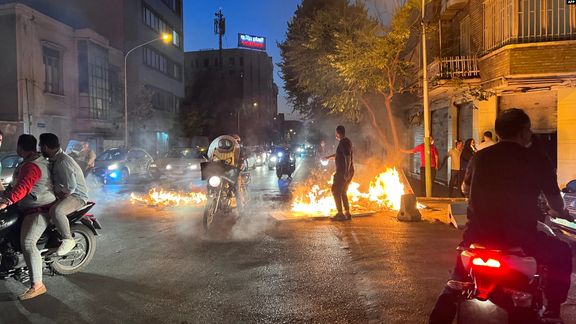
Sunday protests across Iran were mainly focused on reactions to the mysterious fire at Tehran’s notorious Evin prison and the death of a schoolgirl in the northwestern city of Ardabil.
Amid a nationwide uprising ignited by death in custody of 22-year-old Mahsa Amini, the protest rallies started at several universities across the country Sunday morning with students at University of Tehran chanting, "Tehran has turned into a Prison, Evin has turned into Slaughterhouse." At least four people died Saturday evening as a large fire spread in Evin Prison while gunshots and blasts were heard.
"Another Cinema Rex Fire Happening. Enough Is Enough, People, Join Us," Tehran University students were heard chanting, referring to the deadly 1978 fire at Cinema Rex of Abadan in southern Iran which killed some 400 people and intensified the 1979 Revolution.
Students at Azad University of Karaj were chanting, "Neither Gaza nor Lebanon, I Sacrifice My Life for Iran" during their rallies at the campus, in defiance of the authorities who have threatened students with expulsion if they continue their protests.
EU foreign policy chief Josep Borrell said on Sunday that he is following evolving reports on the situation in Evin prison, noting that Iranian authorities are responsible for lives of all detainees, including human rights defenders and EU nationals.
Borrell said that he expressed his “most serious concern” to Iranian Foreign Minister Hossein Amir-Abdollahian, saying that the EU “expects maximum transparency on the situation.”
Echoing the sentiments, German Foreign Minister Annalena Baerbock said, “The government of Iran bears responsibility for all those imprisoned in Tehran's Evin Prison, including many political prisoners and demonstrators.”
Protests were also reported at universities in the northeastern city of Bojnourd, the northern city of Babol, and several cities in the southwestern provinces of Khuzestan and Lorestan. Some clashes were also reported in the central city of Yazd, with a population known to be sympathetic to the Islamic Republic.
Outraged by the death of a schoolgirl, citizens of the city of Ardabil also held protest rallies, which broke into clashes in some areas.
School officials in Ardabil tried to force the students to sing the propaganda song “Hello Commander” in praise of Iran’s ruler Ali Khamenei Wednesday, but when some students refused, government agents showed up, beating and assaulting the girls. One student, identified as Asra Panahi, reportedly died of her injuries at the hospital while another one is in critical condition.
Tehran was also the scene of sporadic clashes and demonstrations, with teargas and gunshots used to disperse the protests.
According to videos on social media, a group of residents in Tehran's Ekbatan township held a protest march in the evening, with slogans likening Iran’s Revolutionary Guards to ISIS terrorists, while people residing in the Nazi Abad neighborhood clashed with security forces who tried to disperse their demonstration.
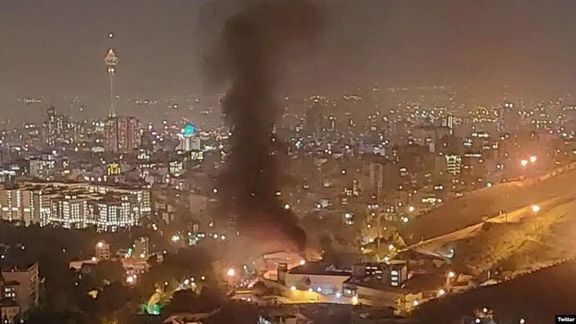
Following a massive blaze at Tehran’s Evin Prison Saturday, some journalists and people on social media accused the Islamic Republic of setting the prison on fire intentionally.
An early and extended furlough to Mehdi Hashemi Rafsanjani, one of the sons of former Iranian president Akbar Hashemi Rafsanjani, has been cited as evidence to support the conjecture.
Yasser Hashemi Rafsanjani, the youngest son of the former president who for years was a kingmaker in the Islamic Republic, revealed the information about his brother’s unusual furlough in a Clubhouse discussion on Sunday.
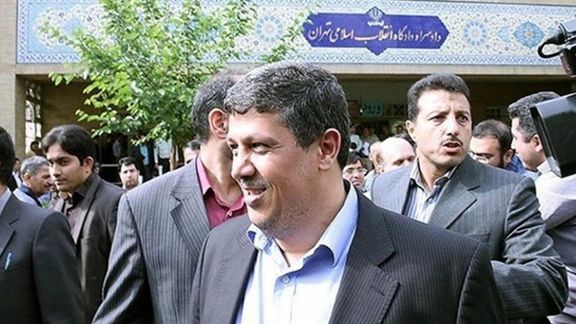
He said that his brother Mehdi – who is serving a 10-year sentence over financial corruption in Evin – was usually let out of the prison on Wednesdays on a two-day leave and had to be back in the prison on Fridays. But this week, he was sent home early and told not to come back until after Saturday, when the fire broke out in the prison.
This has added to speculation that the prison blaze might have been an intentional act by the government, although others believe it could have been a coincidence.
Sources in Tehran told Iran International Sunday morning that four of the inmates had been seen in body covers after the incident, a report later confirmed by Iran's judiciary. Over 60 inmates were also injured in the incident, four of them in critical condition.
Human rights advocate and lawyer Mostafa Nili, in a tweet Sunday said some of the inmates have been removed from Ward Eight, where both political and financial prisoners are held. According to Nili and others, political prisoners in Ward Four were only affected by tear gas and none have been taken away.